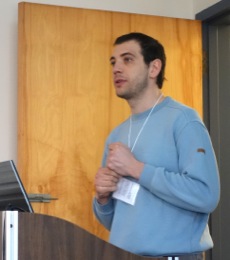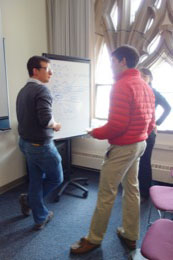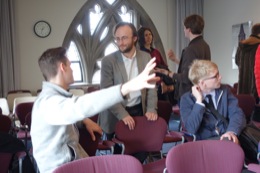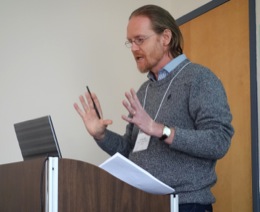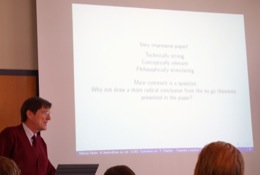

![]()
home
::: about
::: news
::: links
::: giving
::: contact
![]()
events
::: calendar
::: lunchtime
::: annual
lecture series
::: conferences
![]()
people
::: visiting fellows
::: postdoc fellows
::: resident fellows
::: associates
![]()
joining
::: visiting fellowships
::: postdoc fellowships
::: senior fellowships
::: resident fellowships
::: associateships
![]()
being here
::: visiting
::: the last donut
::: photo album
|
The Future of Philosophy of Physics The Center recently celebrated its 50th anniversary. In that sense, it is growing old. In another sense, however, it is getting younger. Over the last few years, we have been trying to make ourselves more accessible to younger scholars. The most visible outcome of these efforts has been our inauguration a few years ago of two Postdoctoral Fellowships. There's more. When we have suitable workshops, we also routinely send out open invitations to any doctoral students whose dissertations deal directly with the subject of the workshop. These efforts are succeeding. We are getting younger; or at least that is how it feels to me. We have never had a complete event, however, devoted to younger scholars specifically. That has now changed. In advance of our workshop on relativistic causality, Giovanni Valente had the bright idea of holding an event that was brewing between the philosophy of physics communities at UC Irvine, Princeton and Pittsburgh. Their plan was bring together graduate students from each place in a collaborative event; and it would happen here in the Center. That sounded like a quite wonderful idea, although the limit to graduate students from those three schools only seemed narrow. Then the organizers decided that they would open the event to everyone with a call for proposals. What resulted was a first for us here. It is an event spread over a day and half with speakers from everywhere who are all graduate students or were very recently so. It was an especially interesting event, for I could sit and watch the future eagles of our profession taking their early flights. It was breath-taking to watch. The talks covered many topics. We had talks probing novel proposals in cosmology, the ontology of quantum field theory, idealizations in statistical physics and speed-ups in quantum computing. That was just the morning of the first day. What was powerfully in evidence was the technical accomplishment and philosophical astuteness of each speaker. I could not help but feel enormous optimism for the future of our professions, along with a rueful gratitude that I did not need to compete with this cohort in the tussle for jobs. One small element was rather pleasing to me personally. I keep a pretty rich website and, to illustrate the content, have prepared lots of figures and drawings, all readily accessible from any browser. They now appear in all sorts of places. I noticed one yesterday, for example, in a Scientific American blog. (I'm published in Scientific American! Alas, without attribution.) When they appear in someone's talk, it is as if an old friend has popped in. Old friends popped in twice in two different talks on the first day. Noel Swanson remarked that he'd Googled the Rindler wedge and my image came up as the nicest image. I was more flattered than I'd readily admit.
In the abstract, that sounds like a great idea and you would surely not expect anyone to hesitate over it. Which junior scholar would not want such exposure of their work to a Great? I'll admit to you that I am one of the unlikely ones who has the mixed feelings. This is an unpopular sentiment that I keep to myself, or at least do so mostly.
My feeling is that the real value of an event like this lies not in exposing a new generation to the old fossils. Rather, it is the occasions in which the new scholars meet for the first time, making the early connections that will become the bonds of a lifelong friendship. Part of the problem is that I've seen too many scheduled comments on talks that were merely dead air and took up time that might have been better spent in open discussion. Being Old and Great does not mean that you have anything especially insightful to say about this specific talk; or that you want to put the time into finding something truly important to say. And if you do have something, and it is negative, then you might well hold your tongue. You have a difficult choice. Do you emit a series of blandnesses that do not offend? Or do you tell the truth, or your perception of it, and offend? As it happens, I have a more personal reason for being shy of famous commenters. When I was starting out, I was in the position several times of receiving public comments from one particular Great. Both occasions were, unfortunately, memorable. The Great was faced with the choice above. He did not hesitate to take the second option and with some gusto. So I was curious to see how the various commenters would approach their tasks. Perhaps this would be the event that would change my perspective.
Another took off in a different direction. The commenter announced that he intended the remarks to be constructive. "However," he continued, "it won't sound like it." That left little doubt of the fairly direct disputation that followed. What was heartening, however, was that some of commenters provided warm and genuine support. After one speaker gave a development that was well beyond my powers in mathematical complication, the commenter engaged in a passionate defense of why this mathematically dense work was not just philosophically relevant, but important. Another made real efforts to assure the speaker of his admiration of the talk. The first screen he displayed says it well. The speaker remarked it was one he'd like for his wall. (Here it is!) Perhaps the best of all was this. I sat next to one commenter as he was reviewing his notes. He turned to me and confided, "I don't know what I'm going to say. It's just a perfect paper!" "Well," I replied, "why not just say that and sit down. It would be the perfect comment." Fortunately, that isn't what happened. The commenter followed his plan of encouraging the speaker to say more. It was a good decision. There is one commenter for whom I will forgo any assessment--that is me. I tried to be supportive and useful and I'll leave others to judge if I succeeded. I did, however, use the event to do something unusual. We have few or perhaps no photos of the room that shows what the speaker sees at the podium. It is akin to the view down the lion's throat, past the gaping jaws, as it leaps towards you. That, I announced from the podium as I took my position, was about to change. I pointed my camera at the room and this is what it saw. John D. Norton
|
